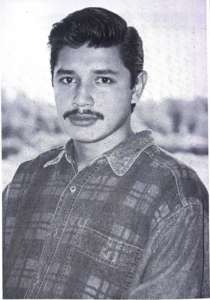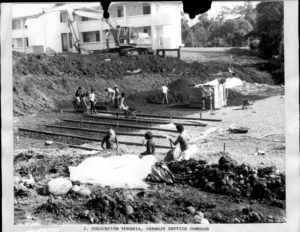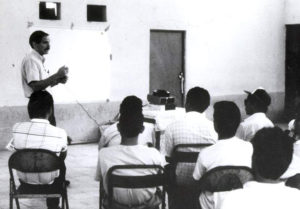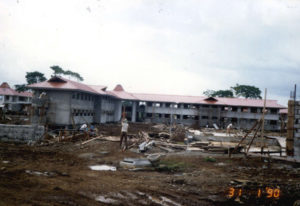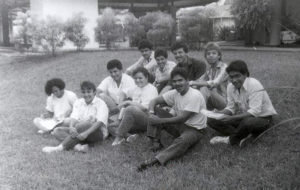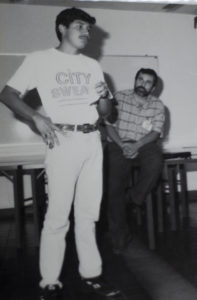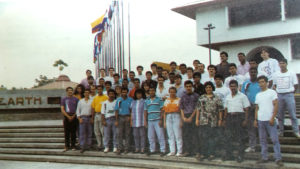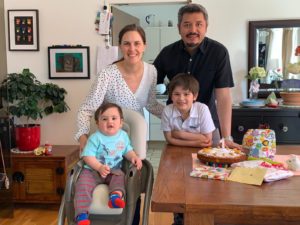EARTH in 1990: A pioneering student reflects
Born in the highlands of Quetzaltenango, Oscar Arreola (’93, Guatemala) attended a military academy for three years. Although young, he felt certain he did not want to continue into combat training.
When EARTH University faculty members Daniel Sherrard and Germán Vargas arrived at his school to talk about the University, Oscar knew immediately that the opportunity to study at EARTH was right for him. A few months and an acceptance letter later, he packed his things to travel to Costa Rica alongside seven other Guatemalans, all dreaming of becoming agricultural engineers.
With a nostalgic chuckle, he recalls some vivid details of the trip: the large plane, the tasty first meal at Soda Tapia, the surprise of hearing Costa Ricans casually toss around phrases like “mi amor”.
The date was March 19, 1990. Oscar – and 50 other students – were en route to EARTH’s founding campus in the province of Limón. His soon-to-be classmates were young, came from different countries, cultures, and backgrounds, and seemed nervously uncertain yet tremendously excited about what lay ahead. Upon passing through Cerro Zurquí, part of Cordillera Central’s volcanic mountain range, the landscape changed suddenly. The tropical air turned thick and hot. Of course, it was raining. The bus exited the main road and moved along an old path. Through the windows, the young people saw verdant pastures and cattle grazing roadside. At the campus, the bus finally stopped in front of the student-residence buildings. Oscar remembers seeing large mounds of dirt dotting even more pastureland. Many buildings were merely plotted, while others were under construction. Upon arriving at room 103 of the Laurel building – his bedroom – he could smell the varnish, fresh paint, and brand-new sheets. Everything was new. Laborers were laying foundations, painting walls, and giving shape to the rest of EARTH’s Guácimo Campus.
When dinnertime hit, the throng of students walked to the cafeteria, which was then a small building near where the sports complex is located nowadays. “There was no swimming pool, no gym, no academic building that we now call ‘Académico Uno’, no library,” he says. What did exist, however, was the promise that this space – seemingly full of gaps and empty lots – was becoming an institution that would transform the lives of thousands of people around the world, including Oscar’s.
During orientation week, students met the entire staff and their families who resided on campus. A rich sense of community was already beginning to form. In the beginning, students were required to remain on campus, which, according to Oscar, gave them the time to get to know each other as well as professionals like Carlos Burgos, Irio Molinari, and Daniel Sherrard. In time, the University grew, buildings were inaugurated, and pastures were either reforested or converted into educational farms. And the pioneers saw it all.
Well, they did not merely see; rather, they diligently contributed to developing the spaces we all love today.
1990 was a memorable year for EARTH students. The recreational TV could not receive a signal from the local channels, so the students would gather around to watch the three movies available on VHS cassettes. One of them was Pretty Woman, which Oscar remembers viewing several times. Mostly, they studied, worked, and explored their new environment. Sometimes they would engage in youthful mischief, such as clandestinely hiking several kilometers to the town of Pocora to mingle with locals. It was a learning process for the entire faculty, staff, and students. Through it all, they grew.
“The most valuable part about living together was learning to have freedom with responsibility. That gave us a sense of security. We could, within the rules, make our own decisions and accept any consequences. I was coming from a strict military school and suddenly I was at EARTH, where I was given the space to make decisions, to grow, and to be autonomous,” Oscar says. “I liked the closeness between everyone, especially with those who were in leadership. They demonstrated genuine interest in ensuring we students were well. That trust and affection helped us develop a greater social conscience – not only agriculturally, but through empathy and respect for others’ lives.”
In his daily life, Oscar follows the many values he internalized at EARTH – even as time goes by. He currently lives in Germany, where he imports and distributes coffee, brown sugar, and cacao bought directly from a Guatemalan cooperative of 1,750 farmers who follow sustainable agricultural practices. As a professional, he has been a leader of change in different countries, and today, he continues supporting subsequent generations of EARTH students in any way he can. “I’m still in contact with many of them, and I even recommended a student to do her internship at the Federación de Cooperativas de Guatemala. Naturally, I want to give back to the University at least a little bit of what it has given me.”
Oscar says that studying at EARTH was a transformative experience, which guided him toward becoming a tolerant and empathetic person. He recalls that it was in the academic farms, the labs and classrooms, and the student residences where he came to recognize that respect entails listening to and seeking to understand others’ ideas, emotions, and stories. He affirms that living in a multicultural space with myriad perspectives widens each student’s vision of the world and endows them with sensitivity and generosity toward other realities. Living together on that campus, which was only taking shape, pushed him and everyone else to foster a deep sense of community, to take care of and celebrate one another. Even 30 years later, that feeling endures.
Oscar Arreola and his classmates overcame the challenges and savored the adventures of a first year, thanks to the community that supported and accompanied them. That community of educators, neighbors, donors, and more helped them mark a path so that upcoming generations could follow their lead and work to transform the world.

